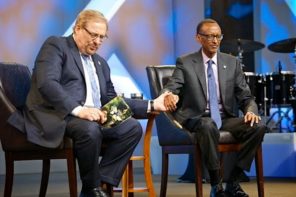If you even nominally follow the world of evangelical Christianity, you already know that superstar pastor Mark Driscoll has stepped down for an indefinite period of time from his pastoral role at Mars Hill Church, the megachurch in Seattle that he co-founded. Even from an outsider’s perspective, Driscoll’s gradual fall from grace has been painful to watch.
Driscoll, of course, has always been controversial, which to his followers is part of his allure. But with the exception of his most stalwart defenders, recently his actions and overall persona have become almost impossible to defend. Here on RD Becky Garrison recounted Driscoll’s misdeeds, from the charges of plagiarism, to his gaming of the New York Times Bestseller List, to his reputation as a hyper-masculine misogynist and homophobe with an authoritarian leadership style.
[T]he scheme itself is part of an overall ethos that seeks to proselytize “by every means available.” What’s important, in other words, is that people hear “about Jesus”—however that might happen.
The whole process is, I’m sure, a sad episode for current and former supporters, as it is a happy one of the legion of Driscoll-haters out there—and there are many of the latter. Whether one is for or against Driscoll, popular opinion seems to view his downfall under the categories of “moral” and “spiritual” failure. Hence, in order to steer things back in the right direction, the best course of action is one of rebuke and, ultimately, removal, which is the course taken by Acts 29 and now Mars Hill Church—just as his critics have wanted.
There’s of course something to that line of thought, but it seems too easy. Specifically, it puts all the focus on Driscoll and ignores the culture that produced him in the first place. Partly through the shrewd use of media, evangelical culture, especially, tends to elevate its leaders to almost divine status, in many cases setting them up for an inevitable fall.
Driscoll’s fall is, in this sense, not surprising in the least, as he joins the ranks of other fallen stars, such as Jim and Tammy Faye Bakker and, more recently, Ted Haggard. More could be mentioned, and others likely wait in the wings. But it’s also not surprising that so much investment in one person would eventually lead to that person acting, at the very least, in an authoritarian fashion. It shouldn’t even need to be pointed out that that’s what power tends to do to people—too much of it anyway.
I would also suggest, however, that many of Driscoll’s actions are inseparable from the overall belief system behind it, which is not particular to Driscoll and largely shared among large swaths of evangelical Christianity. For instance, should it really be all that shocking when hyper-missional churches, such as Mars Hill Church and those affiliated with Acts 29, use means that otherwise may be deemed suspect, for the ultimate end of reaching and saving “the lost”? Thus when Driscoll and his church were accused of gaming the system to catapult Real Marriage to best-seller status, Mars Hill’s Justin Dean justified the campaign as follows:
Mars Hill has made marketing investments for book releases and sermon series, along with album releases, events, and church plants, much like many other churches, authors, and publishers who want to reach a large audience. We will explore any opportunity that helps us to get that message out, while striving to remain above reproach in the process. Whether we’re talking about technology, music, marketing, or whatever, we want to tell lots of people about Jesus by every means available.
The end, here, clearly justifies the means, and although Driscoll certainly had a hand in the scheme, the scheme itself is part of an overall ethos that seeks to proselytize “by every means available.” What’s important, in other words, is that people hear “about Jesus”—however that might happen.
Likewise, although in its statement of “doctrinal distinctives” Acts 29 states that both men and women possess “the same moral dignity and value, and have equal access to God through faith in Christ,” it also stresses that “God has given to the man primary responsibility to lead his wife and family in accordance with the servant-leadership and sacrificial love characterised by Jesus Christ.”
This “principle of male headship” extends to the church, as well:
The Elders/Pastors of each local church have been granted authority under the headship of Jesus Christ to provide oversight and to teach/preach the Word of God in corporate assembly for the building up of the body. The office of Elder/Pastor is restricted to men.
Although Acts 29 stresses that “male headship” should not be confused with “domineering control,” it’s no anomaly that given the terms such control is the real result, historically and in the present. Nor is it an anomaly when the imaginary of “male headship” expresses itself in overtly misogynstic and homophobic terms, as in Driscoll’s case. It’s a logical result of a “ministry” that grounds itself in inequality, and it would, unfortunately, be easy to draw up similar instances.
All of which is to say, any criticism of Driscoll should also be directed at the system that allowed him to emerge in the first place. Driscoll may certainly be an extreme case among evangelical leaders and evangelical culture more generally, but we should not understand him as an exception.
We—though evangelicals in particular—should, rather, seek to understand how particular beliefs give rise and lend support to a certain ethos and specific actions, even if the latter don’t always manifest themselves at the individual level. The problem is, in other words, larger than Driscoll, so any attempt to remedy his “moral” and “spiritual” failings should take a broader view. Doing anything less risks perpetuating the worst aspects of Driscoll’s legacy.





